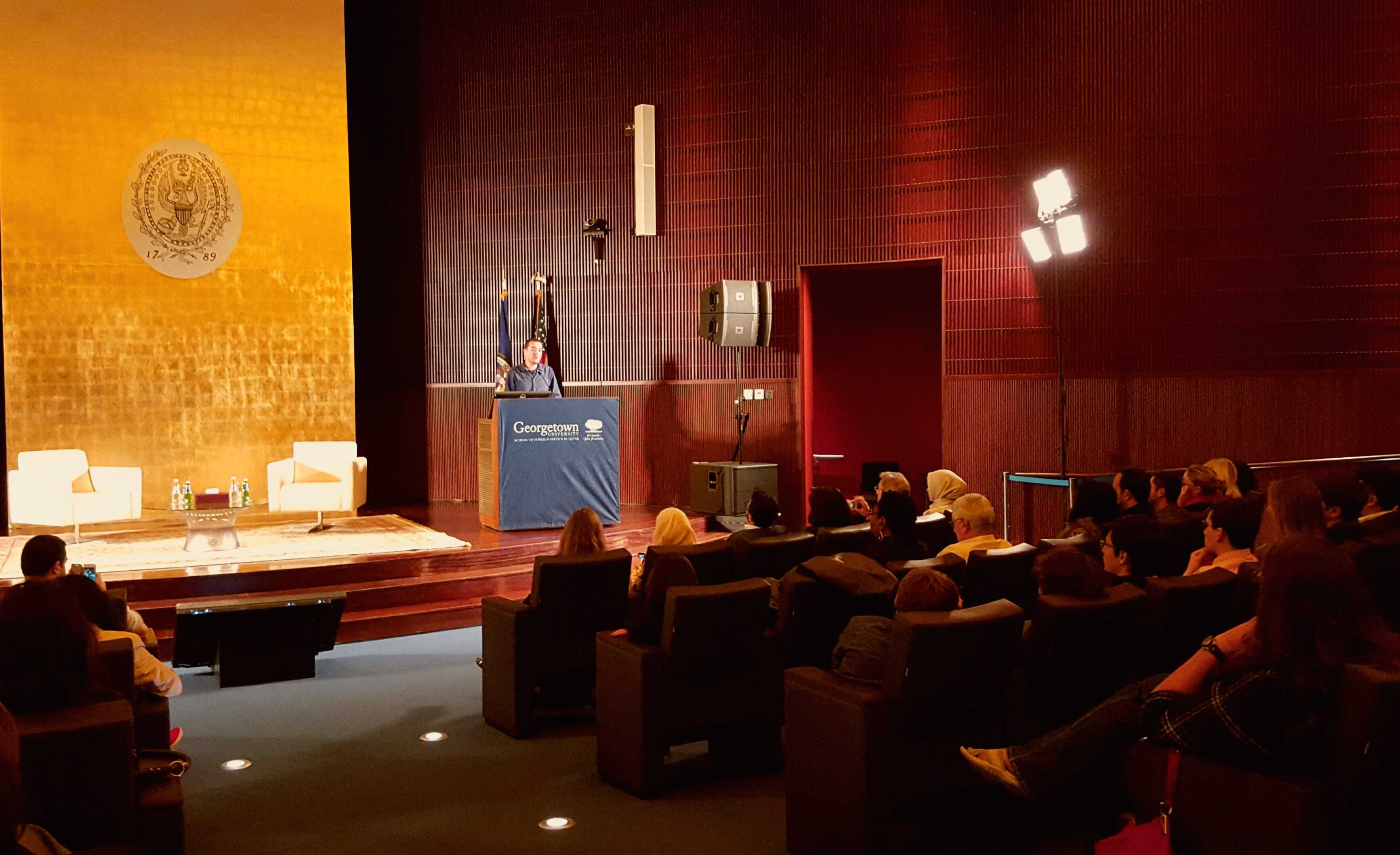
Written by Fatima Hassan. Photo by Ifath Sayed.
Al Jazeera English producer Baher Mohamed, who was one of three Al Jazeera journalists imprisoned in Egypt for nearly two years for their reporting on the country’s political issues, addressed a crowd of approximately 250 people at Georgetown University in Qatar last night.
Mohamed spoke about his arrest, imprisonment and court trial in Egypt, as well as his plans to advocate for greater press freedom in the Gulf region and beyond.
Before his arrest in 2013, Mohamed had worked with Japan’s Asahi Shimbun newspaper from 2008 to 2013. He joined Al Jazeera in May 2013 and covered the mass opposition protests against President Mohamed Morsi.
“I wasn’t pleasing a specific side,” he said, which he believed irritated both the government and its opposition. “I decided I was happy with that, that I wasn’t pleasing any side and that they both were annoyed with me. We were covering everything, and that is why we were put behind bars.”
According to The Telegraph, Egyptian authorities accused Baher and his two colleagues, Mohammed Fahmy and Peter Greste, of supporting terrorist activities. The arrests came amid the rise in tension between the Egyptian government and Qatar, one of the Gulf countries that not only owns the Al Jazeera network, but also supported President Morsi.
Mohamed was arrested on the December 29, 2013.
“The police stormed my house,” he said. “They shot my dog, took my camera, took my equipment, even stole the money I was saving for a vacation with my family.”
After his arrest , they took him to a security police camp, where the others interred there told him stories about the camp’s terrible conditions. On the second day he was taken to the state prosecutor.
“I was told that I was going to a better place but I realized that the opposite was going to happen,” he said. Later he was sent to the maximum security Egyptian prison called the Scorpion Prison.
The conditions at the Scorpion Prison were abysmal.
“I slept on cement, with no light. We were in the dark 24/7,” Mohamed said. With bad food, no exercise and next to zero human interaction, it was a very trying period for him, he added.
When asked how he kept sane, Mohamed pointed out that the lack of conversation was what was most unnerving to him, and to counter this he began to talk to inanimate objects. One time, he said, the guards gave him an onion and instead of eating it, he put it in a plastic cup and placed it underneath a single beam of sunlight that entered his cell. He would then talk to this onion and have entire conversations with it. Another time in prison he was kept with former government officials and ministers.
“Everyone was so quiet,” he said “So I said ok, I’m making my own radio station and I asked everyone to speak on different programs. We talked, sang and made jokes.”
This make-believe radio station was not only a means of escape for the prisoners, but even the guards were entertained, he said. “The guards came to me one day and said, the warden comes to listen to your show every night and even has a few questions,” Mohamed said, laughing..
The trial itself had been uneventful for Mohamed,” he explained. “I asked the judge to present the evidence against me so that I could defend myself but he didn’t. There was no evidence against me,” Mohamed said. “I felt that I didn’t do anything wrong and I was proud of my work.” He was eventually pardoned and released in 2015.
After his release, Mohamed could not believe the massive support he received from all around the world.
“I never thought Obama would mention my name!” he confessed to the audience, who laughed at this comment. “All the competitors, BBC, Al Jazeera and CNN united together for press freedom. Even the United Nations and other international organizations spoke about us and for us. We were three journalists working in Egypt, no one knew us. The people’s reaction was strong because they care about press freedom.”
Mohamed now is a strong advocate for press freedom.“Without press freedom, we won’t know what is going on anywhere,” he said.
“There would be total blackout. Press freedom is a hardcore element of a healthy society. It applies everywhere. Why are people behind bars for speaking their opinion? Why are countries afraid of people speaking?”
So strong is his conviction for this mission that he has no regrets about what happened to him in Egypt. “If I were to go back in time, I would do the same,” he said. “ I want my son to live in a healthy society. I hope I can make a change and bring press freedom.”
Mary Dedinsky, associate professor in residence and director of the journalism program at Northwestern University in Qatar, attended the public talk and said Mohamed’s conversation was inspiring and informative. “I liked how he defended press freedom and explained why he does not believe in media limits. It was also emotional for me to hear that he would do it again if he had to,” she said.
Arshee Ansari, a graduate from MES Indian school, was also in the audience and said she was greatly impressed with Baher Mohamed’s talk: “I think he is a fascinating person and he answered all the questions very well. Many people in this region advocate media limitations at some level, but I am impressed by his strong stance on media freedom.”
